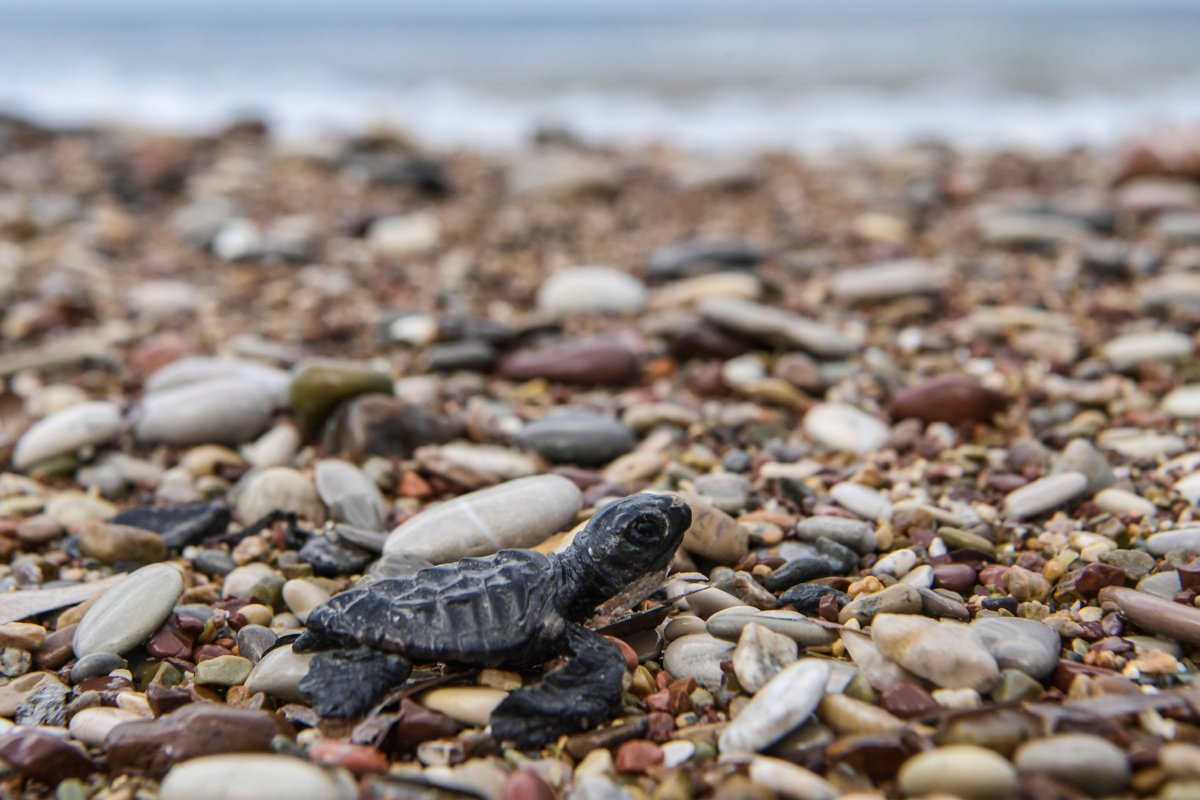New research has provided fresh insight into why sea turtles find discarded pieces of plastic so appetizing—it not only looks like food, but smells like it too.
A paper published in Current Biology has demonstrated how floating plastics can develop a film of algae and other microorganisms that disguise the synthetic nature of the material. According to the scientists involved, this is the first paper to show the smell of plastic could be encouraging animals to eat it.
The team observed 15 captive-reared loggerhead turtles from Bald Head Island, North Carolina, in a lab setting and monitored their response to scents delivered through a pipe into the experimental area. The turtles appeared unbothered by the smells of clean plastic and water but were more intrigued by the smells of food and ocean-soaked plastics.
The researchers noticed heightened levels of activity as the turtles poked their noses out of the water to sniff the odor. Their nostrils spent three times as much time out of the water when scents of food and ocean-soaked—or "biofouled"—plastic were being pumped into the area, compared to the other scents.
"Biofouled plastic is plastic that has been 'marinating' in the ocean so to speak, and has grown numerous small organisms on it- including algae, barnacles, mollusks, and the like," Kayla Goforth, a biology doctoral student at the University of North Carolina who worked on the study, told Newsweek.
"Once it's grown these small organisms, these organisms emit dimethyl sulfide (DMS) which is an odor that smells like food to a turtle. We know from previous work that turtles can detect DMS and use it as a feeding cue."
One of the leading theories why so much plastic ends up in the guts of sea turtles and other marine animals is that they mistake their appearance for food—a plastic bag, for example, could be mistaken for a jellyfish. This adds a new dimension to the dilemma and suggests their sense of smell could be equally key.
"This new research regarding sea turtles' attraction to the smell of plastics is particularly concerning because it adds a new dimension to the plastics threat," Nick Mallos, the senior director of Ocean Conservancy's Trash Free Seas program, told Newsweek.
"Previously, the research suggested that sea turtles mistook plastic bags and other debris for jellyfish and other prey. Now it seems appearance isn't the only factor."
But it's not just sea turtles. The study's authors point out that there are close to 700 species of marine mammals, including endangered species of turtle and whale, that are threatened by plastic sea debris through ingestion of small parts and entanglement in fishing equipment.
"It takes as little as half a gram of plastics to kill a juvenile sea turtle, which means even minimal exposure can be lethal," said Mallos.
The best way to prevent this from happening is to prevent plastics from ending up in the ocean—recent projections suggest there could be more plastic than fish in our oceans by the mid-century if current trends continue.
"Plastic production has increased exponentially since the 1950s, as has the amount of plastic pollution ending up in marine ecosystems worldwide," Charlie Rolsky, Director of Science of Plastic Oceans, told Newsweek.
"The most frequently seen plastic object digested by sea turtles falls within a class of plastic that closely resembles morphological characteristics of turtle prey. These include translucent and more flexible plastic items such as plastic bags, which closely resemble jellyfish, one of the most common sources of prey for several turtle species."
The current study looked at airborne smells. The team now hopes to investigate waterborne odors emitted by the plastics, which may present a greater threat to older sea turtles.
In the meantime: "Hopefully it will make people think twice before leaving a plastic bottle on the beach, or will inspire them to take a reusable water bottle on a trip instead of buying a disposable plastic one," said Goforth.

Uncommon Knowledge
Newsweek is committed to challenging conventional wisdom and finding connections in the search for common ground.
Newsweek is committed to challenging conventional wisdom and finding connections in the search for common ground.
About the writer
To read how Newsweek uses AI as a newsroom tool, Click here.





